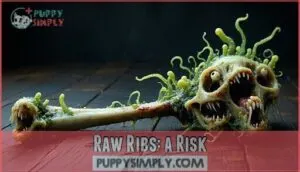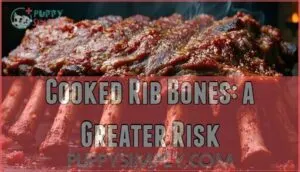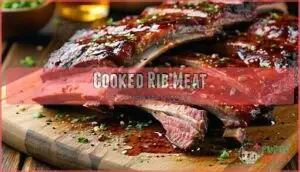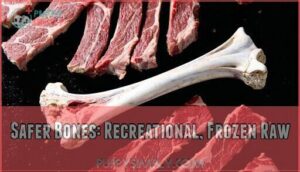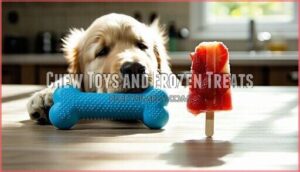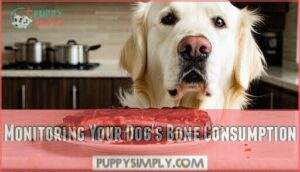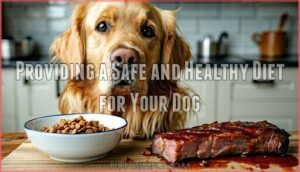This site is supported by our readers. We may earn a commission, at no cost to you, if you purchase through links.

While the meat itself isn’t toxic, the real danger lies in the bones.
Cooking makes rib bones brittle, meaning they can easily splinter when chewed, potentially causing choking, tears in your dog’s stomach or intestines, or life-threatening blockages.
Even a small piece can spell trouble.
Plus, any seasoning or sauces on the ribs—like garlic, onion, or excess salt—can be harmful to your pup.
If you’re looking for safer ways to treat your dog to something special, there are plenty of healthy alternatives.
Knowing what’s safe keeps tails wagging and worries low, and it’s all about being aware of the potential dangers, like life-threatening blockages, to ensure your dog’s well-being.
Table Of Contents
- Key Takeaways
- The Risks of Feeding Dogs Rib Bones
- Safe Alternatives to Rib Bones
- Can Dogs Eat Cooked Pork Ribs?
- Monitoring Your Dog’s Bone Consumption
- Providing a Safe and Healthy Diet for Your Dog
- Frequently Asked Questions (FAQs)
- Can dogs eat pork rib bones?
- Can dogs eat raw ribs?
- Can dogs have beef rib bones?
- What happens if a dog eats rib bones?
- Are rib bones safe for dogs?
- Can dogs eat cooked beef & pork?
- Is it safe to give dogs cooked pork ribs?
- Why can’t dogs eat cooked pork?
- Will pork bones dissolve in a dog’s stomach?
- Is rib meat safe for dogs?
- Conclusion
Key Takeaways
- Don’t give your dog cooked pork ribs—they splinter easily, causing choking, intestinal tears, or blockages.
- Cooked rib meat without seasonings is safer but should still be served in small portions and without bones.
- Opt for safer alternatives like chew toys, dental treats, or large raw recreational bones designed for dogs.
- Always supervise your dog with bones or chews and watch for signs of digestive issues.
The Risks of Feeding Dogs Rib Bones
When you give your dog rib bones, you’re putting them at serious risk for choking, internal injuries, and digestive blockages.
Giving your dog rib bones risks choking, internal injuries, and severe blockages—protect their health with safer alternatives.
Cooked bones splinter easily and can puncture your pet’s mouth, throat, or intestines, which may require emergency surgery.
Raw Ribs: a Risk
Raw pork ribs bring a host of hidden dangers that many dog owners overlook.
The biggest concern isn’t just bacterial contamination from salmonella or E. coli—it’s the parasite exposure risk, including dangerous roundworms that can wreak havoc on your pet’s system.
These raw bones maintain their structural integrity, meaning they’re less likely to break cleanly and more prone to creating sharp fragments.
The result? Potential digestive issues ranging from upset stomachs to serious intestinal problems.
Plus, your dog’s nutrient absorption gets compromised when their system fights off these unwanted invaders lurking in uncooked meat.
Raw pork can also expose your dog to trichinella spiralis, a dangerous bacterium.
Cooked Rib Bones: a Greater Risk
Heat transforms pork rib bones into dangerous weapons inside your dog’s mouth.
Cooked brittleness makes these bones splinter easily, creating sharp fragments that pose severe choking hazards.
These bone splinters can cause internal punctures throughout your dog’s digestive system, potentially requiring surgical removal.
Unlike their raw counterparts, cooked bones dogs consume become brittle death traps.
Rib bone dangers multiply exponentially after cooking, making intestinal obstruction a frightening reality for unsuspecting pet owners.
Plain ribs may seem safer, but they still pose a risk of gastrointestinal distress, which can lead to severe choking hazards and internal punctures.
Cooked Rib Meat
Your dog’s digestive system can handle cooked rib meat better than bones, but seasoning concerns remain paramount.
Plain, lean pork benefits include quality protein, yet portion control prevents pancreatitis from excessive fat.
Cooking methods matter—avoid barbecue sauces containing garlic or onion powder.
While adult dogs tolerate small amounts, puppy consumption isn’t recommended due to developing systems.
Remove all cooked bones dogs shouldn’t have, as pork ribs for dogs become dangerous when splintered, making cooked pork ribs problematic despite the meat being safer, due to the risk of splintered bones.
Safe Alternatives to Rib Bones
You can provide your dog with safe chewing options that satisfy their natural instincts without the serious risks that come with rib bones.
Commercial dental chews, frozen raw bones designed for dogs, and specially made chew toys offer the same satisfaction while protecting your pet from choking hazards and internal injuries, providing a satisfying alternative.
Safer Bones: Recreational, Frozen Raw
Large recreational bones offer a much safer chewing experience than pork ribs for dogs.
These weight-bearing bones from cows or buffalo provide essential bone marrow and nutrients without the choking hazard of smaller rib bones.
Raw benefits include natural dental cleaning and mental stimulation.
Always supervise chewing sessions and choose bones large enough that your dog can’t swallow them whole.
Some owners grind bones into their pet’s food for safer consumption.
Unlike are pork ribs safe concerns, properly selected recreational bones minimize dog health risks while satisfying natural chewing instincts and providing essential nutrients.
Large recreational bones are a better choice than pork ribs because they minimize dog health risks.
Chew Toys and Frozen Treats
Kong toys and rubber-based alternatives offer your dog safe chewing without the choking hazard that pork ribs and bones create.
These Safe Chew Materials provide mental stimulation while protecting your pup’s digestive system from dangerous fragments.
DIY Frozen Treats made from plain broth or mashed fruits give dogs something satisfying to gnaw on during hot days.
Puppy Chew Toys designed for smaller mouths prevent accidents while supporting growing teeth. Look for Dental Health Toys that scrape away plaque as your dog chews.
Pancreatitis is a risk due to the high fat content in ribs.
Flavor Variety keeps things interesting—rotate between different textures and tastes. Your dog gets the chewing satisfaction they crave while you get peace of mind knowing they’re safe from internal injuries.
Dental Chews for Ongoing Bone Needs
Dental chews are a fantastic way to satisfy your dog’s chewing instincts while keeping them safe.
Unlike risky rib bones, VOHC-approved products are designed to reduce plaque and tartar without splintering.
Choose safe chew sizes based on your dog’s breed and chewing behavior, and always supervise chewing to prevent accidents.
Rotate chew toys to maintain interest, and check ingredients to avoid harmful additives.
Many owners purchase dog dental chews from online retailers.
Safe dog chews, like VOHC-approved options, are excellent dog bone alternatives that support oral health and overall well-being.
Can Dogs Eat Cooked Pork Ribs?
Cooked pork ribs might seem like a tempting treat for your dog, but they come with hidden dangers.
Cooked pork ribs may seem tempting, but they pose serious risks like choking, splintering, and dangerous intestinal blockages for your dog.
From harmful seasonings to splintering bones, it’s important to know the risks before sharing.
Dangers of Giving Rib Bones to Dogs
Rib bones might seem harmless, but for dogs, they’re a recipe for trouble.
Cooked pork ribs, in particular, can spell danger. They’re prone to bone splintering, which can cause internal punctures to the stomach or intestines. Add choking hazards and the risk of teeth fractures, and these bones quickly become more harm than treat.
Digestive blockage is another serious concern, especially if pieces lodge in their system.
Key dangers of rib bones for dogs include:
- Bone splintering: Can lead to internal punctures or severe injuries.
- Choking hazards: Small or brittle pieces can block airways.
- Digestive issues: Blockages or irritation from bone fragments.
- Teeth fractures: Hard bones cause painful dental damage.
Skip ribs and stick to safer chew options.
Safe Alternatives for Dogs
Instead of risky cooked pork ribs, try dog safe treats like VOHC-approved products or safe chew alternatives.
Commercial treats for Dental Health or dog safe bone alternatives mimic the benefits of chewing without the dangers of splintering bones. Cooked bones pose dangers due to their brittle nature and tendency to splinter.
Frozen treats or Lean Proteins like cooked, unseasoned chicken offer both nutrition and fun. Adding Broth Options made from plain meat can also satisfy your pup.
Always make certain chew sizes are appropriate to avoid choking hazards.
Monitoring Your Dog’s Bone Consumption
Keep a close eye on your dog when they’re around bones to prevent choking or blockages.
Monitor for signs like drooling, coughing, or vomiting, and contact your vet immediately if you notice anything unusual.
Warning Signs: Choking, Blockages
Watch closely for choking hazards or blockage symptoms like drooling, coughing, vomiting, or lethargy after your dog eats something risky.
Bone fragments from pork ribs are bad for dogs and can cause severe intestinal blockages. Post-consumption monitoring is essential—bloody stool or discomfort might signal problems.
Act fast if you notice these signs, as emergency care from an experienced vet is often needed to prevent further complications, and it requires immediate attention.
Immediate Vet Visit Needed for Choking
If your dog shows choking signs after eating pork ribs, act fast. Cooked bones easily splinter and can obstruct breathing or cause internal injury. Emergency vet attention is non-negotiable, as delays risk aspiration pneumonia or worse.
- Choking First Aid includes the Heimlich Maneuver for dogs.
- Watch for pawing, gagging, or panic.
- Bone lodging signs need swift action.
- Emergency vet costs may vary.
Signs of Blockage: Drooling, Coughing, Vomiting
How can you tell if pork ribs are bad for dogs? Look for drooling causes, coughing remedies, and vomiting triggers—these are signs of a potential blockage.
Cooked bones can splinter, causing severe digestive issues or choking hazards.
Blockage severity increases if symptoms persist, so take immediate actions to prevent complications and guarantee your pup’s safety. Veterinary attention may be necessary.
X-rays to Determine Passage or Vomiting Need
If your dog shows signs of intestinal blockage after eating pork ribs, X-rays offer clarity.
They reveal bone fragment location, obstruction confirmation, or perforation detection.
This aids surgical planning if needed.
Cooked pork ribs are bad for dogs’ digestive health, with risks like blockages or dog gastrointestinal issues.
X-ray costs typically range from $75 to $500, depending on various factors.
Always seek veterinary attention—early assessment prevents severe complications and guarantees your pup’s safety.
Providing a Safe and Healthy Diet for Your Dog
To keep your dog healthy, it’s important to offer a balanced diet that meets their nutritional needs.
Providing plain, unseasoned, and fully cooked meats, along with fresh water, guarantees they stay safe and well-fed.
Water and Bone Broths
Hydration matters for your dog, and broth can help! Bone broth offers nutrients that support digestion and joint health.
If dogs eat pork, stick to small portions of plain, boneless meat. Avoid broth with harmful ingredients like onions or garlic.
For broth safety, use simple recipe ideas, ensuring no additives. You can find dog bone broth online for your pet.
Cooked pork ribs and their bones are bad for dogs, posing serious risks.
Some Dogs Aggressive With Bones, Feed Separately
When dealing with resource guarding or aggressive behavior around bones, safety comes first.
Some dogs become territorial, especially in multi-dog households. Separate feeding spaces help avoid tension and keep everyone calm. Supervised feeding is key to monitor your pup’s chewing instincts and prevent accidents.
Check out these tips:
- Opt for bone alternatives like dental chews or sturdy toys.
- Train using positive reinforcement to reduce guarding tendencies.
- Avoid cooked pork ribs entirely—bones splinter, and pork ribs are bad for dogs.
Always prioritize safety and consult your vet to ensure the best approach for your dog’s specific needs, using supervised feeding as a crucial tool.
Frequently Asked Questions (FAQs)
Can dogs eat pork rib bones?
Let’s not sugarcoat it—pork rib bones are a no-go for dogs.
When cooked, they become brittle and can splinter, causing choking, internal injuries, or blockages.
Stick to safer alternatives for happy, healthy pups.
Can dogs eat raw ribs?
Dogs shouldn’t eat raw ribs.
Raw pork risks bacterial infections like salmonella or trichinosis, which can cause serious health issues.
Always cook ribs thoroughly, remove bones, and avoid seasonings to guarantee it’s safe for your dog and prevent trichinosis.
Can dogs have beef rib bones?
Imagine this: Your dog chewing on a beef rib bone, then coughing or gagging.
It’s risky—beef rib bones splinter easily, causing choking or internal injuries.
Safer options? Lean, boneless meat or vet-approved chews.
What happens if a dog eats rib bones?
If your dog eats rib bones, it risks choking, splintered pieces puncturing the digestive system, or intestinal blockages.
Watch closely for vomiting, diarrhea, or pain, and contact your vet immediately if any symptoms appear.
Are rib bones safe for dogs?
Here’s the skinny: rib bones aren’t safe for dogs.
Cooked ones can splinter easily, causing choking or serious internal injuries. Raw ones carry bacteria risks.
Stick to dog-safe treats and avoid rib bones altogether.
Can dogs eat cooked beef & pork?
Cooked beef and pork can be safe for dogs if plain, boneless, and unseasoned.
Skip fatty cuts, spices, and bones, as these can harm them.
Always serve in moderation and consult your vet first.
Is it safe to give dogs cooked pork ribs?
Better safe than sorry—cooked pork ribs can be dangerous for dogs.
Bones splinter easily, causing choking or internal injuries.
Stick to plain, boneless, well-cooked pork in small portions to avoid health risks.
Consult your vet.
Why can’t dogs eat cooked pork?
Cooked pork can be risky for dogs because seasonings, sauces, or fats may harm their digestion.
Additionally, cooked bones splinter easily, posing serious choking or internal injury hazards.
Stick to plain, boneless, fully cooked portions instead, avoiding harmful seasonings.
Will pork bones dissolve in a dog’s stomach?
Think of pork bones like brittle glass—they don’t dissolve in a dog’s stomach.
Instead, they can splinter, causing blockages or internal injuries.
Always skip the bones and opt for safer, boneless treats for your pup.
Is rib meat safe for dogs?
Rib meat can be safe for dogs if it’s plain, boneless, and thoroughly cooked.
Avoid seasonings or sauces, and serve in moderation.
Always watch for adverse reactions, and consult your vet for personalized advice.
Conclusion
Regarding the question, “Can dogs eat cooked pork ribs?” the answer is a definite no.
Cooked rib bones can splinter easily, causing choking, intestinal tears, or blockages, risking your dog’s health.
Even the meat may contain harmful seasonings.
Instead, opt for safe alternatives like raw recreational bones, chew toys, or dental treats.
Always monitor your dog and consult a vet if concerns arise.
Keeping your pup safe makes their happiness and your peace of mind possible.
- https://www.merckvetmanual.com/dog-owners/digestive-disorders-of-dogs/disorders-of-the-stomach-and-intestines-in-dogs
- https://onlinelibrary.wiley.com/doi/10.1111/jvim.16383
- https://www.researchgate.net/publication/352300264_Chewing_behaviour_in_dogs_-_A_survey-based_exploratory_study
- https://cookingupdate.com/are-cooked-pork-ribs-safe-for-dogs/
- https://www.dogsintl.com/can-dogs-safely-eat-pork-rib-bones-expert-advice-on-dog-bone-safety/

